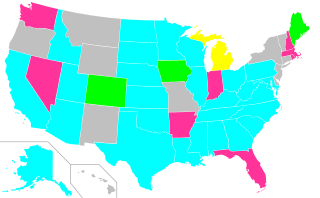
Abortion in the United Kingdom is de facto available under the terms of the Abortion Act 1967 in Great Britain and the Abortion (No.2) Regulations 2020 in Northern Ireland. The procurement of an abortion remains a criminal offence in Great Britain under the Offences Against the Person Act 1861, although the Abortion Act provides a legal defence for both the pregnant woman and her doctor in certain cases. Although a number of abortions did take place before the 1967 Act, there have been around 10 million abortions in the United Kingdom. Around 200,000 abortions are carried out in England and Wales each year and just under 14,000 in Scotland; the most common reason cited under the ICD-10 classification system for around 98% of all abortions is "risk to woman's mental health."
The Eighth Amendment of the Constitution Act 1983 was an amendment to the Constitution of Ireland which inserted a subsection recognising "the equal right to life of the pregnant woman and the unborn". Abortion had been subject to criminal penalty in Ireland since at least 1861; the amendment ensured that legislation or judicial interpretation would be restricted to allowing abortion in circumstances where the life of a pregnant woman was at risk. It was approved by referendum on 7 September 1983 and signed into law on 7 October 1983. In 2018, it was repealed by referendum.

Attempted murder is a crime of attempt in various jurisdictions.
Assault occasioning grievous bodily harm is a term used in English criminal law to describe the severest forms of battery. It refers to two offences that are created by sections 18 and 20 of the Offences against the Person Act 1861. The distinction between these two sections is the requirement of specific intent for section 18; the offence under section 18 is variously referred to as "wounding with intent" or "causing grievous bodily harm with intent", whereas the offence under section 20 is variously referred to as "unlawful wounding", "malicious wounding" or "inflicting grievous bodily harm".
Concealment of birth is the act of a parent failing to report the birth of a child. The term is sometimes used to refer to hiding the birth of a child from friends or family, but is most often used when the appropriate authorities have not been informed about a stillbirth or the death of a newborn. This is a crime in many countries, with varying punishments.

The Offences against the Person Act 1861 is an Act of the Parliament of the United Kingdom of Great Britain and Ireland. It consolidated provisions related to offences against the person from a number of earlier statutes into a single Act. For the most part these provisions were, according to the draftsman of the Act, incorporated with little or no variation in their phraseology. It is one of a group of Acts sometimes referred to as the Criminal Law Consolidation Acts 1861. It was passed with the object of simplifying the law. It is essentially a revised version of an earlier Consolidation Act, the Offences Against the Person Act 1828, incorporating subsequent statutes.
Murder is an offence under the common law of England and Wales. It is considered the most serious form of homicide, in which one person kills another with the intention to cause either death or serious injury unlawfully. The element of intentionality was originally termed malice aforethought, although it required neither malice nor premeditation. Baker, chapter 14 states that many killings done with a high degree of subjective recklessness were treated as murder from the 12th century right through until the 1974 decision in DPP v Hyam.

In criminal law, the term offence against the person or crime against the person usually refers to a crime which is committed by direct physical harm or force being applied to another person.

R v Davidson, also known as the Menhennitt ruling, was a significant ruling delivered in the Supreme Court of Victoria on 26 May 1969. It concerned the legality of abortion in the Australian state of Victoria. The ruling was not the end of the case, but rather answered certain questions of law about the admissibility of evidence, so as to allow the trial to proceed.
The law of Northern Ireland is the legal system of statute and common law operating in Northern Ireland since the partition of Ireland established Northern Ireland as a distinct jurisdiction in 1921. Prior to 1921, Northern Ireland was part of the same legal system as the rest of Ireland.

Criminal damage in English law was originally a common law offence. The offence was largely concerned with the protection of dwellings and the food supply, and few sanctions were imposed for damaging personal property. Liability was originally restricted to the payment of damages by way of compensation.
The born alive rule is a common law legal principle that holds that various criminal laws, such as homicide and assault, apply only to a child that is "born alive". U.S. courts have overturned this rule, citing recent advances in science and medicine, and in several states feticide statutes have been explicitly framed or amended to include fetuses in utero. Abortion in Canada is still governed by the born alive rule, as courts continue to hold to its foundational principles. In 1996, the Law Lords confirmed that the rule applied in English law but that alternative charges existed in lieu, such as a charge of unlawful or negligent manslaughter instead of murder.
Child destruction is the name of a statutory offence in England and Wales, Northern Ireland, Hong Kong and in some parts of Australia.

Polygamous marriages may not be performed in the United Kingdom, and if a polygamous marriage is performed, the already-married person may be guilty of the crime of bigamy under section 11 of the Matrimonial Causes Act 1973.

The Infant Life (Preservation) Act 1929 is an Act of the Parliament of the United Kingdom. It created the offence of child destruction. The Act retains three sections, the most substantive legal changes of which are in the first section.
The Abortion Law Reform Act 2008 is an abortion law reform passed by the Victorian Parliament in the Australian state of Victoria in 2008. The reform bill sought to amend section 65 of the Victorian Crimes Act 1958, which had codified the common law offences relating to abortion. The reform also repealed section 10 of the Crimes Act dealing with a separate offence of child destruction.
Foeticide, or feticide, is the act of killing a fetus, or causing a miscarriage. Definitions differ between legal and medical applications, whereas in law, feticide frequently refers to a criminal offense, in medicine the term generally refers to a part of an abortion procedure in which a provider intentionally induces fetal demise to avoid the chance of an unintended live birth, or as a standalone procedure in the case of selective reduction.
Assault with intent to resist arrest is a statutory offence of aggravated assault in England and Wales and Northern Ireland and the Republic of Ireland.

Born alive laws in the United States are fetal rights laws that extend various criminal laws, such as homicide and assault, to cover unlawful death or other harm done to a fetus in utero or to an infant that has been delivered. The basis for such laws stems from advances in medical science and social perception, which allow a fetus to be seen and medically treated as an individual in the womb and perceived socially as a person, for some or all of the pregnancy.
Diane Munday is a British political activist who, as a leading member of the Abortion Law Reform Association (ALRA) from 1962 until 1974, played a prominent role in the decriminalisation of abortion in the United Kingdom with the Abortion Act 1967. She was also a co-founder of the British Pregnancy Advisory Service. A longtime associate of the secular humanist movement, she has been named a patron of Humanists UK.








